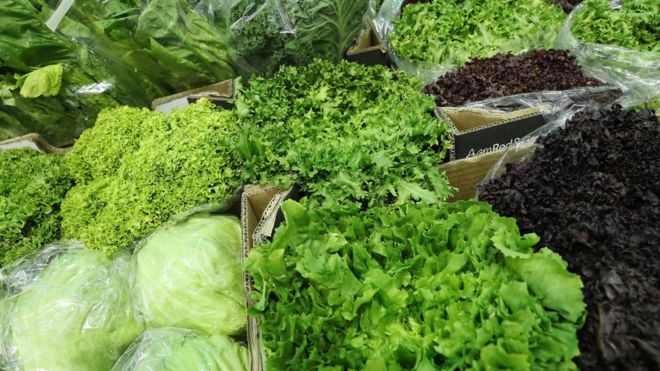Source: bbc.com
Published: July 19, 2017

Plenty’s first farms will grow lettuce and other greens. Getty Images
Plenty, a San Francisco vertical farming start-up, has raised $200m (£154m) from big-name investors that include Japanese media giant SoftBank, Alphabet’s Eric Schmidt and Amazon boss Jeff Bezos.
Plenty said it would use the money to expand in the US and abroad.
The firm, founded in 2013, has an indoor growing system that uses less space and water than traditional farms.
It plans to bring its first self-grown food to market this fall.
“We’re now ready to build out our farm network and serve communities around the globe,” said Matt Barnard, chief executive and co-founder.
Plenty employs 100 people in three facilities in San Francisco and Wyoming. It has raised more than $226m since its start.
Mr Barnard said the firm has already signed up online and bricks-and-mortar distributors for the food, which will initially be dominated by leafy vegetables and herbs.
He declined to name the distributors or say where new facilities are planned, but said future announcements are planned.
SoftBank led the financing round through its SoftBank Vision Fund. Mr Schmidt and Mr Bezos invested through their Innovation Endeavors and Bezos Expeditions firms, respectively.
Mr Bezos’s company, Amazon, has also made a major push in the grocery market with a plan to acquire Whole Foods.
“We believe that Plenty’s team will remake the current food system to improve people’s quality of life,” said Masayoshi Son, chief executive of Softbank Group.
Mr Barnard, 44, grew up on a farm growing apples and cherries in Wisconsin. He told the BBC locally grown food tastes better, since it doesn’t need to survive weeks of transport.
Plenty’s growing system – kind of like a living wall – and control over the environment, allows for water to be recycled easily.
It also makes growing crops more efficient. The firm says it can produce up to 350 times more per square foot than traditional farms.
The firm is planning indoor farms on land of two to five acres – roughly the size of Home Depots or Walmarts. Mr Barnard said the food will be competitively priced, thanks in part to a shorter supply chain, and within reach of a range of incomes.
“We want to get nutrient-rich food into as many different budgets as possible,” he said.
